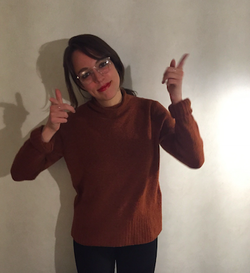
Hi, I'm Becca. I am the non-fiction book critic of the Washington Post, an editor at The Point, and a contributing editor at The Boston Review . My essay collection, All Things Are Too Small, was published Metropolitan Books in the US and Virago in the UK in April 2024. The New York Times called it "splendidly immodest" and "exhilarating" and The Guardian called it "bracing and brilliant." It was a New York Times editors' pick and a New Yorker weekly recommendation. Finally, I am also a PhD candidate (on indefinite hiatus) in philosophy at Harvard, but i remain perhaps delusionally convinced that someday I will finish my dissertation. These days I live in Washington, DC, with this person, whom I love. Here you can find all of my Washington Post pieces, which will come out each week, generally speaking.
To keep up with my writing/rantings, subscribe to my substack here. As a writer: I have contributed essays, book reviews, and the occasional art review to publications like The TLS, The Nation, The New York Times Book Review, The New Yorker, The Atlantic, Liberties, Bookforum, Art in America, The Yale Review, The Baffler, and more. These days, I write mostly for the Washington Post about non-fiction, but occasionally I write essays on fiction and whatever else for other venues. I am the winner of the first annual Robert B. Silvers Prize for Literary Criticism (see more here) and the 2023 Nona Balakian Citation for Excellence in Reviewing (see more here). In 2017, I was a finalist for a National Magazine Award in the essays/criticism category. A few authors I especially love are Joseph Roth, Italo Svevo, Henry James, Henry Green, Heinrich von Kleist, Marie de France, and Norman Rush. My agent is Anna Sproul-Latimer of Neon Literary. As a (lapsed?) philosopher: I am primarily interested in aesthetics (especially aesthetic value and its relationship to other types of value), the philosophy of love and sex, and the history of German philosophy, especially Martin Heidegger, although I have increasingly consuming secondary interests in political philosophy. In "The Good, the Bad, and the Ugly," published in The British Journal of Aesthetics, I defend aestheticism, the view that aesthetic value is sometimes a partial grounds of moral value. I describe aestheticism in more detail in a chapter in the Oxford Handbook of Ethics and Art. If I ever get around to completing it, my dissertation will be about some combination of the following: what it is to be a beautiful person, why evolutionary psychologists are wrong about human beauty, the ethics of exclusionary romantic/sexual/aesthetic preferences, and what role the state should play in ameliorating inequitable distributions of intimate "goods." I hold a first-class MPhil in the history and philosophy of science from the University of Cambridge and a B.A., summa cum laude with high honors, from Dartmouth College, where I studied philosophy & German (and cultivated an enduring distaste for fraternities). I receive many emails asking for advice about graduate school applications. I have answered some frequently asked questions on this page. As I note there, I do not consider myself an expert in how to write a successful graduate school application, and I urge all prospective grad students to consult resources online, as well as supervisors who have served on admissions committees, rather than me! Before the pandemic, I followed Hegel in regarding nature as geistlos, but now, like any good Heideggerian, I am a big fan of hiking. Here I am in the Berkshires, which I love
|
|
"...I am still trying to reconcile pain with pleasure, but the negotiation remains impossible. The most popular academic definition of pain, from the International Association for the Study of Pain, specifies that it’s disagreeable: “Pain is an unpleasant sensory and emotional experience that is associated with actual or potential tissue damage or described in such terms” (emphasis mine). In other words, physical damage doesn’t qualify as painful unless we come to dislike it: “Experiences which resemble pain but are not unpleasant, e.g. pricking, should not be called pain.” So it would seem that masochism—defined by Freud as “pleasure in pain”—is hopelessly paradoxical. As soon as a feeling shades into pleasure, it quits the domain of the painful; but a pleasure too painful negates itself." Read more here (or preferably, in print, here). (You should subscribe to The Point, which is consistently interesting and insightful.)
*A brief note about this text, which it's rather frightening to publish: I follow William Gass in thinking that, in general, we should work hard to develop a more nuanced sexual vocabulary. Sex is a hugely important part of human life that we rarely discuss without falling prey to squeamishness, and our descriptive resources in this domain remain woefully impoverished. Moreover and maybe more importantly, I think it's hugely unfortunate that almost all the widely visible discussions of female sexuality in contemporary culture are either themselves objectifications of women or wrenching accounts of female victimization and disempowerment at the hands of terrible men. Women can and should enjoy sex, and the denial of this manifest fact is at the root of so much suffering. I think it's hugely important at this cultural moment--and in general!--for women to try to celebrate their desires. All of which explains both why I'm scared to have published this and why I felt I should. I hope you enjoy it, and, if you're a woman, I'll hope you'll celebrate your sexual agency. Happy almost-2018! May glass ceilings shatter! May consensual sex, both vanilla and non-, be enjoyed!
0 Comments
If literature or scholarship reflected its author’s moral failings, brutality would contravene brilliance: Wrongdoing would amount to its own punishment. We would never have to confront the galling affront of a beautiful thought birthed by a hideous thinker — nor would we persist in demanding decency from the gorgeous and the interesting, to our repeated disappointment. Read more here.
|
Archives
June 2022
Categories |

 RSS Feed
RSS Feed